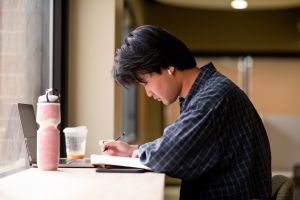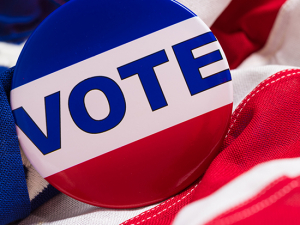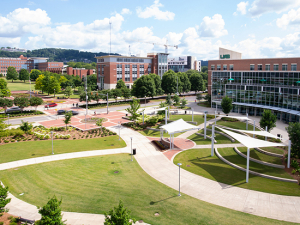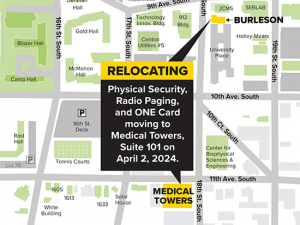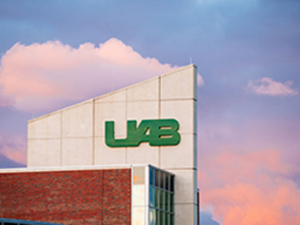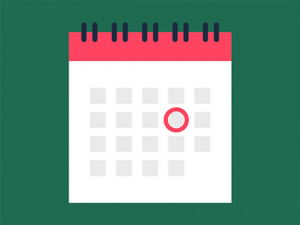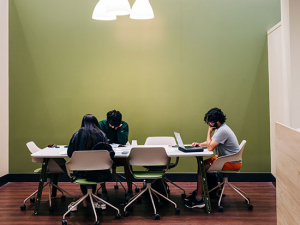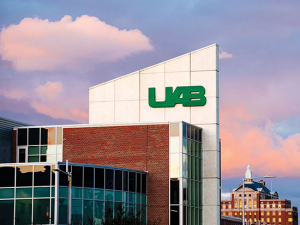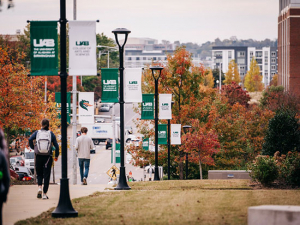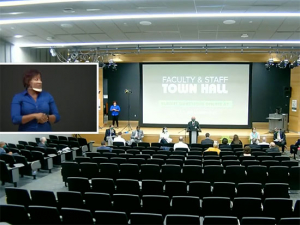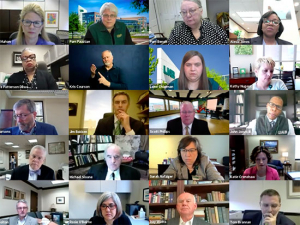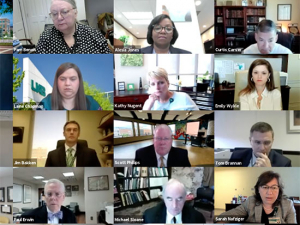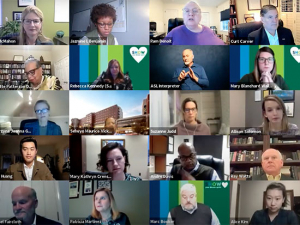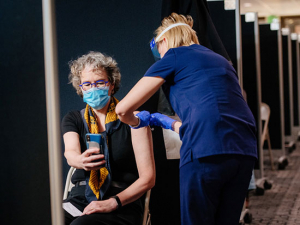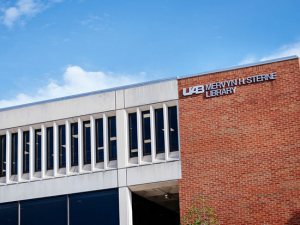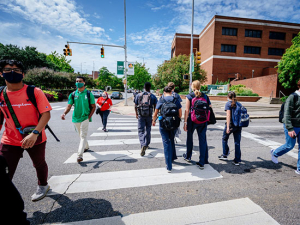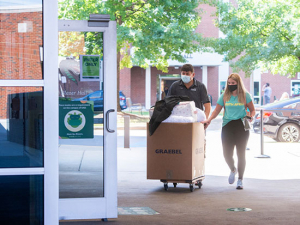President Ray Watts and other UAB leaders shared insights on the first weeks of fall semester and answered questions on flu shots, residence halls, spring semester and more.
“Thank you for your active involvement in the first three weeks of this fall semester,” Watts said. “It has gone well.” UAB is set to announce all-time record enrollment for the fall semester for the fifth straight year, Watts said, with an increase of about 500 students more than the 22,000 students enrolled in fall 2019.
Scroll down to read the complete summary or use the links below to jump to specific topics
UAB’s COVID-19 positivity rates among the lowest in the nation
Would a COVID-19 vaccine be required?
UAB’s COVID-19 positivity rates among the lowest in the nation
UAB has had 56 students test positive from Aug. 19 to Sept. 10, which is among the lowest rates in the nation “for the size and complexity of our campus, with our academic medical center,” Watts said. “Don’t let your guard down,” he cautioned. “We want a full fall semester.”
“I want to start by congratulating you on your resilience,” said Provost Pam Benoit. “The feedback I’m getting from students and faculty is that classes are going well and students are doing well under difficult circumstances. We all appreciate that and we know that everyone is working as hard as they can to continue to accomplish their dreams.”
[back to topic list]
Vigilance is key
UAB has “done remarkably well compared to a number of other higher education institutions,” Benoit said. “We have to keep that up. Vigilance is the key word.” There are six ways to do that, she explained:
- Wear your masks indoors and outdoors
- Practice social distancing
- Do not gather in large groups
- Complete Healthcheck daily
- Participate in sentinel testing when randomly selected
- Download the Exposure Notification App
[back to topic list]
Student Health
No charge for COVID-19 testing
“If, based on your symptoms, you need to be testing for COVID-19, here at Student Health you will not be charged,” said Michael Faircloth, M.D., medical director for Student Health. “We offer the rapid antigen test that has results in about 60 minutes, and then we have the genetic PCR test that is sent to a lab and has a 24-hour turnaround.”
[back to topic list]
‘Get a flu shot as soon as possible’
“We are entering cold and flu season,” Faircloth said. “Getting a flu shot has always been an important preventative measure, but this year the importance is magnified. Flu and COVID-19 symptoms are similar and this makes clinical decision-making difficult. So please, get a flu shot as soon as possible.”
| This information is accurate as of publication. For the latest information on testing procedures and protocols, visit the uab.edu/uabunited site. |
Student Health will receive its flu shots later this week, Faircloth said. Once they are received, they will be available the next day. “We’ll share a message when they are available and the process to get a shot.” Pharmacies such as CVS, Walgreens and other commercial locations are already providing flu shots, Faircloth said. “Take advantage of those resources and get a flu shot wherever you can,” he encouraged.
Additional questions submitted online
There is a conception that getting a flu shot too early is bad because it wears off too soon. Is that true?
“The flu shot works for sure for about four months and then it tends to wane,” said Michael Saag, M.D., professor in the Division of Infectious Diseases. “If you got your flu shot in mid-September, by January or February it could wane and there could be a recommendation for another flu shot then.”
Will UAB offer free flu shots in January as a booster if necessary?
“If there is a recommendation for a second flu shot, then I am sure we will do all that we need to do to make sure that everyone gets it,” Saag said. “That is right,” Watts added. “You can rest assured on that.”
[back to topic list]
Why sentinel testing is so important
“We know that the [COVID-19] virus is in our community and it has been plaguing us since late February or early March,” said Michael Saag, M.D., professor in the Division of Infectious Diseases. “It’s easy to understand what the virus wants: it just wants to find someone to infect… Our job is to keep it from doing that.”
One important part of that is sentinel testing, Saag said. The word “sentinel” is used because “it goes back to a word for guards keeping watch to see any foreign threats are coming up,” he explained, likening it to the opening scene of “Hamlet,” in which a lone sentry responds the rattle of chains from Hamlet’s father’s ghost by calling out “Who’s there?”
“The virus is there, and we can’t see it,” Saag said. “So we do sentinel testing to monitor the campus and see who might have become infected — and if there is a hotspot emerging, we can address it before it is widespread on campus.”
Who takes part in sentinel testing?
“Everyone is registered — faculty, staff and students,” Saag said. “Then we randomly pick 3% to 5% of the population each week. Students are in your own group and if you live in a residence hall, as opposed to someone not in a residence hall, those subgroups are also randomized.”
“If you are picked, you are asked to come get tested,” Saag said. Students selected receive an email with a link listing location and a choice of dates and times for testing, he explained. “It is simple — once you are there it is less than five minutes,” with results communicated within 24 to 48 hours. (Students who test positive will receive a phone call from Student Health with more information on how to keep themselves and others safe.)
[back to topic list]
The right way to wear a mask
Saag also demonstrated the proper way to wear a mask — covering both the mouth and the nose. “It has to cover your nose and mouth,” he said. “Wearing it like this [below the nose] isn’t going to cut it.” That is because “if you are breathing or taking or shouting and singing, you are sending out a cloud of virus around you, from two to three feet,” Saag said. “When you put on a mask, it reduces about 90% of what you would put out [otherwise].”
[back to topic list]
Response to hybrid courses
What kind of feedback are you getting from students and parents about how the hybrid teaching model is working?
“We’ve gotten positive feedback from students and parents that people are trying very hard to provide a great experience,” Benoit said. “They are seeing creativity in the classroom, and the different variety of experiences are going well. The technology is working well. As with any time you are doing something new there are ways that we can improve, and we’ll continue to work on those. One thing we have heard from students is that faculty put their syllabi together in different ways. We’re trying to provide guidance for faculty on that for next term.”
“I’m teaching a nine-credit hybrid course, Monday, Wednesday and Friday, and I have a different group of 37 students attending each day,” said Michael Sloane, Ph.D., professor in the Department of Psychology and director of the University Honors Program. “Students seem to be enjoying it, and attendance is full. Students are showing up for in-person class days and we have a system whereby we take questions and comments through the chat feature for those online.”
Sloane said that he had asked his students for feedback on what could be tweaked and improved about his course. “Students should not be shy about suggesting in a positive way things that can be improved,” he said. “That is what you are paying for.”
“I met with graduate student leaders last week and asked them to share positive and negative experiences,” added Lori McMahon, Ph.D., dean of the Graduate School. “They had almost all positive comments. They see how hard faculty are working, and they appreciate the innovation… Where they thought there could be improvement is the Canvas shell where faculty are placing syllabi and reading assignments. We’re going to work with faculty to see if we can make that easier for students.”
[back to topic list]
Tuition
Why are students being charged full price when their classes are hybrid or remote?
“One of the misnomers about online instruction is that it is cheaper,” Benoit said. “It is much more expensive. It requires a much larger investment in technology and hardware. In order to do hybrid courses there is a lot of work to do with facilities…. And faculty are still working full-time, no matter what the mechanism is. We continue to try to provide a great experience. To do that, we have to have funding to provide it. Most classrooms are fully utilized and cleaned and a lot of the other expenses for making the university go are still in place.”
[back to topic list]
Commencement
What will graduation look like for the fall semester?
“We will not have an in-person commencement,” Benoit said. “The last thing we need is to bring students back to campus after Thanksgiving. We will do a virtual celebration, and we will encourage students to put together a video as we did in previous celebrations.”
[back to topic list]
Student life
Why is UAB hosting football games when student organizations are not allowed to hold events off campus?
“We put in place the same safety measures at Legion Field as on our campus,” Watts said. “Everyone must socially distance and wear a mask. That stadium has 70,000 seats and our average attendance last year was 20,000 or so. We had our first game a week ago, and everyone behaved in a responsible manner. If we were to have any spike in infections or any inappropriate behavior we will limit the spectators and may even not have any spectators.”
Athletes are “being tested three times a week and are being responsible,” Watts said. “We know that everyone on the field is COVID-negative within 24 hours beforehand. And in the stands we need everyone to be just as serious about safety.”
[back to topic list]
When will fraternity events be allowed?
“Student organizations, including fraternities and sororities, can host in-person events if they meet the programming guidelines for indoor and outdoor events,” said Mary Wallace, Ph.D., assistant vice president for Student Experience. “We have put a moratorium on off-campus events. We will review that when it is safe to do so.”
[back to topic list]
Spring semester
What are the changes that the spring and summer classes upcoming will be offered as hybrid or remote? And can you elect to take a strictly remote schedule through DSS?
“I anticipate that spring will be much like fall,” Benoit said. “That means there will be four methods of instruction: in-person, hybrid, remote and the online format…. I encourage you to consult with your advisors about ways to advance your schedule and complete your program.”
“For students who need to ask for temporary adjustments related to COVID-19, there is a process on our website,” said Alison Solomon, director of Disability Support Services. “I want to clarify that students must meet the criteria we developed in order to receive accommodations for remote classes through Disability Support Services. The student has to be COVID-positive or meet the CDC standards of being higher risk due to COVID-19 or live with someone at high risk for COVID-19. There is an application process to request those adjustments through the website. Feel free to call us for more information.”
For those of us living out of state, how soon before the spring semester starts is it best to come back to Alabama?
“We’re currently in the process of thinking about the spring semester,” Benoit said. “We hope to make an announcement relatively soon about what we might do for January now that we’ve gotten past the hump of the beginning of the fall semester. Look for information coming to you in GreenMail.”
Based on what is being seen at other universities, “it looks common that they have delayed their starting dates and they have decided not to do a spring break,” Benoit said. “When you go to other communities and come back, you have a greater potential of bringing back infections to campus. All of those things are part of the discussion that we are working on. We are listening to the experts about the best choices we could make to protect the health and safety of our students and also provide a quality education.”
[back to topic list]
Housing
Why do we have to move out of the dorms at the end of the semester?
If we have to move out at the Thanksgiving break, why do we have to take our things with us?
“It’s important that we all understand… that no one is exactly certain about what will happen between November and January,” said Marc Booker, executive director of Student Housing and Dining. “We tried to make it clear that it was best for people to bring fewer items with them for fall in anticipation that we would move out fully in November, and then we will determine at that point what spring will look like and whether we will begin on Jan. 11 or if that date will have to be delayed.”
In the past spring semester, “students did not take all their property home and they were without chargers and laptops and things like that,” Booker said. “At this time, we want everyone to take everything with them in November. If you have a circumstance or hardship where you need to stay on campus, for access to WiFi or other reasons, we’ll have spaces available for students to stay between November and December.”
Will students be in the same residence hall rooms next semester?
“For the most part, students will return to their same residence hall,” Booker said. “They may not be in the same apartment or suite.” An exception are those students who asked to be assigned to Green Hall. “Once that is opened in January, we would love to have students occupy that state-of-the-art residence hall,” Booker said.
Are international students charged to stay on campus over the winter break?
“Any student who needs to stay in the residence halls for that period will be charged,” Booker said.
[back to topic list]
Parking
I am in a building that has an attached deck with a lot of empty spaces, but I have a remote parking pass and have to wait several minutes for a bus. Can anything be done about this?
“We have an announcement coming within the next week or so where we will allow students for a nominal fee to switch parking zones,” said André Davis, director of Transportation. “The process will be simple — you will just come in and exchange your permit for the new zone that you request.”
[back to topic list]
Other questions
Once a COVID-19 vaccine is approved, is it going to be required for students and employees? Many of us are skeptical with it being rushed.
“We all want to see a safe and effective vaccine,” Watts said. “I am encouraged that all of our leadership at the NIH and CDC and other agencies have vowed that they would not prematurely adopt a vaccine because of political pressure one way or the other. We hope to have one or more vaccines that could be available in the first or second quarter of 2021. But rest assured that we would not recommend or use anything that is not backed up by the very best of science.”
Is there a way to download Healthcheck to our phones so that we do not have to enter our BlazerID and password each time?
“That is a great question and it is in the hopper of things we want to do in the next 30 days,” said Curt Carver, Ph.D., vice president for Information Technology and chief information officer for UAB. The IT team is adding a version of Healthcheck for campus visitors and will then turn to building Healthcheck into the UAB app. “That will be here in October,” Carver said. “No more logging into Healthcheck.”
How has UAB benefitted from the pandemic?
“What immediately comes to mind is that is has highlighted the expertise on our campus with medicine and public health and we have become leaders in offering information, and being part of clinical trials,” Benoit said. “I think it is pretty amazing how much we have been a leader in being out there on the front lines talking about COVID-19. I think we also have done a great job of implementing technology in our classrooms and as a result of that we now have lecture capture installed in many more classrooms than we did coming into the fall semester. That will be helpful going into the future.”
“I think we are so fortunate to have world-renowned physicians and public health experts who have been at the forefront of the fight against HIV and AIDS like Dr. Saag for almost 40 years,” Watts said. “And he and his colleagues in the Division of Infectious Diseases are some of the most outstanding faculty in the world. The same with other parts of medicine and public health and health professions and informatics and IT. Everyone is working to put together a platform for this campus that has made us one of the safest campuses in the country…. We are providing a world-class education to you and doing research that is changing the future, and we have a lot of research in COVID and COVID vaccines.”
Is the Education Building going to be scrapped in the spring? Don’t we still need it for students to use between classes for remote learning?
“This is a great question, and it hints at the complexity of making changes in the schedule,” Benoit said. “The Education Building has been useful this fall for students to use between classes. It is scheduled for demolition after Thanksgiving. This is going to be the site of the new Science and Engineering Building. So as we work through the schedule for spring we will look for additional spaces for students to study and use between classes.”
“The Education Building required no additional technology to be added for students to connect via WiFi,” Watts said. “We have outfitted Bartow Arena and the Alys Stephens Center and other buildings for students.” The first building in the new Science and Engineering Complex will house the departments of biology, physics and chemistry, Watts said. The second building in the planned three-building complex will be a new home for the School of Engineering.
The campus master plan also had called for the demolition of the Humanities Building, but as UAB’s enrollment has continued to grow the space that the building provides for art and art history instruction is still needed for now, Watts added.
UAB’s newest residence hall, Green Hall, is scheduled to be completed in October and will be ready to house students in the spring, Watts said. It will have an additional dining facility and has received LEED Silver certification for sustainability. Several other new facilities, including buildings for IT and the Honors College, will be completed soon. “There is a lot of excitement for the future,” Watts said.
[back to topic list]
“COVID-19 is with us and may be with us for months and years to come,” Watts said in concluding the town hall. “We know how to deal with it effectively and limit the spread of the virus. But it depends on the appropriate behavior of each and every one of us to follow those known and proven safety measures. Keep up your vigilance, stay safe and well and we're looking forward to continuing a great fall semester.”
